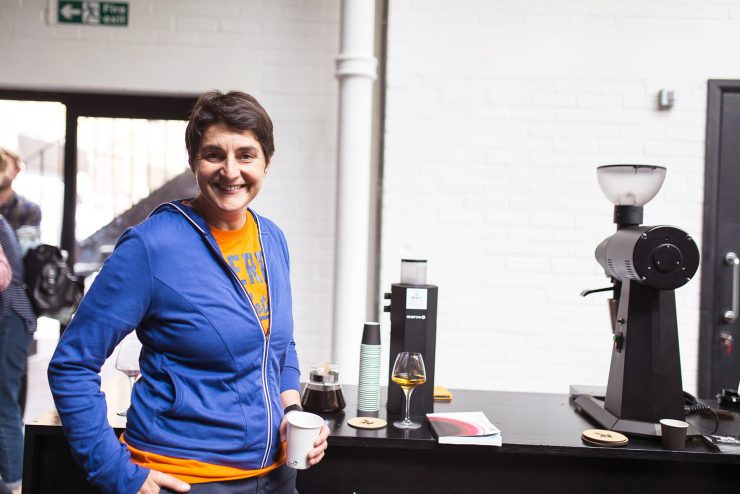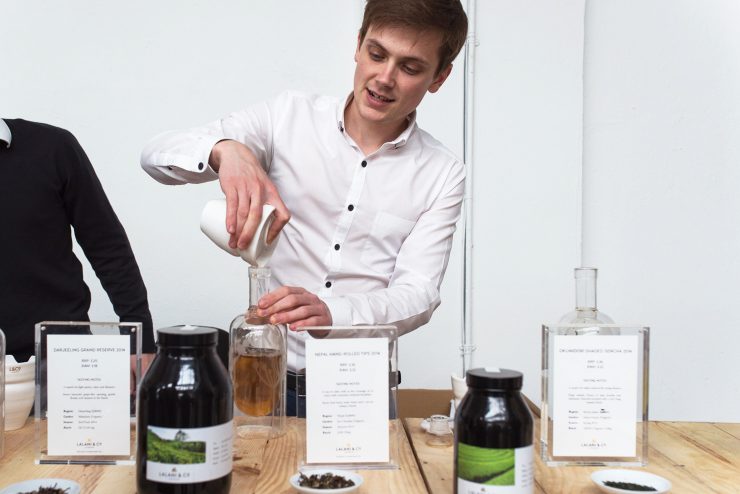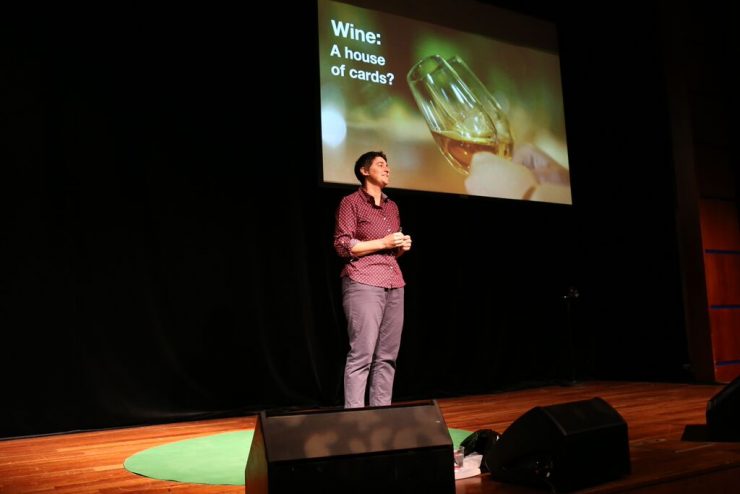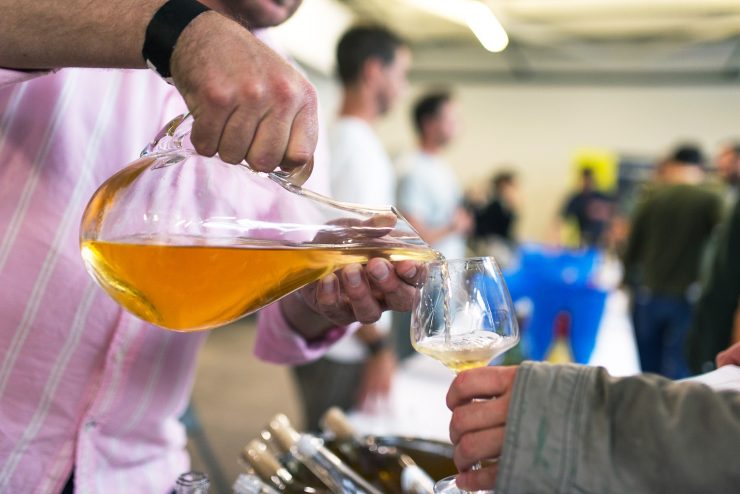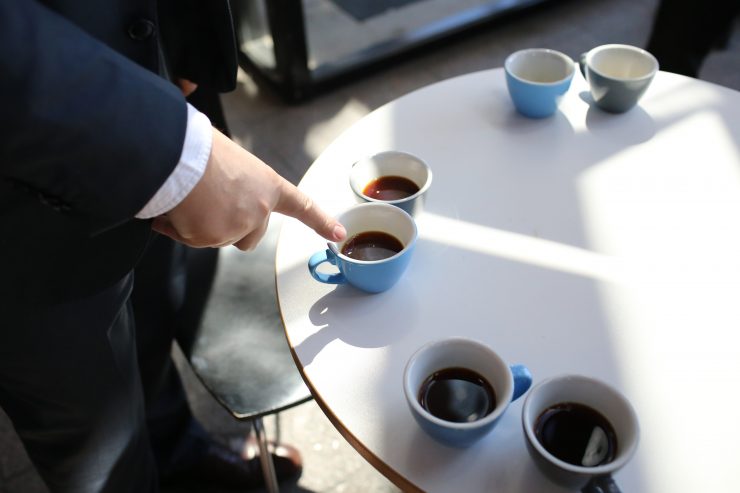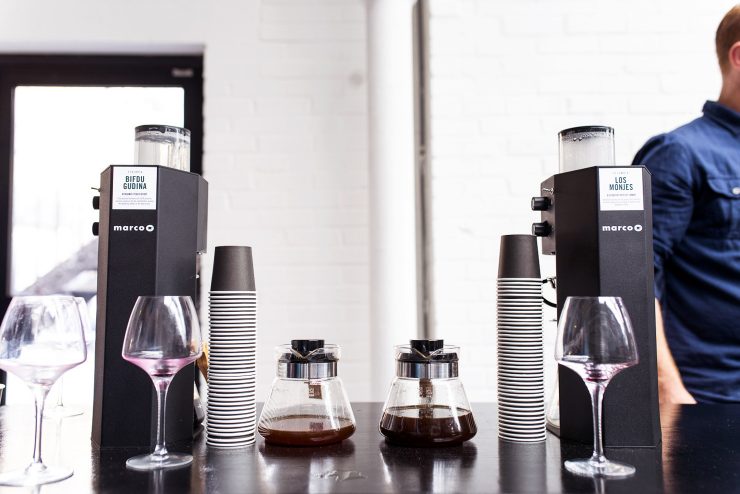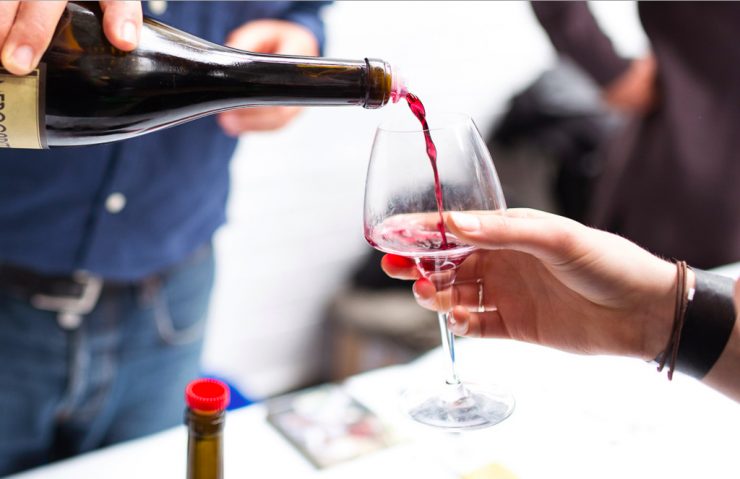A few short weeks ago, Sprudge contributor Giulia Mule brought us the story of coffee’s role at RAW Fair, the world’s leading exhibition of natural wine, held each year in London. The architect of that event is Isabelle Legeron, who holds the distinction of being France’s first female Master of Wine. An author, consultant, and events organizer, Legeron has made it her life’s work to advocate for natural wine around the world. She is also, delightfully, a specialty coffee enthusiast, and so this association made her an inspired selection for the speaking roster at Re:co Symposium, a specialty coffee lecture event held last month in Gothenburg, Sweden.
The worlds of specialty coffee and natural wine are overlapping at an exciting pace, and our enthusiasm for both substances means we’re covering the moment extensively here at Sprudge. In Europe and Australia, it seems like the most natural association in the world, with cutting-edge restaurants as the uniting fulcrum for both movements—if you had to pick a leader, it would surely be Noma, whose sommelier Mads Kleppe helped installed their much-admired restaurant coffee program while overseeing one of the world’s best natural wine lists.
America’s enthusiasm for natural wine has developed more slowly than Europe, and for good reason: most of the world’s great natural wine is made on the Continent, in tiny batches from winemakers and growers primarily in France, Spain, Italy, Germany, Austria, Georgia, and Slovenia. Only a trickle of this wine makes it in to America, and like with coffee, importers play a huge role in access to quality product (New York’s Jenny & Francois Selections are among America’s leading natural wine importers).
But America is developing its own undisputed stars of the movement. To name an incomplete few: wine shops like Chambers Street Wines and Uva in New York City, Local Cellar and Terroir in San Francisco, Silver Lake Wine in Los Angeles, and Pairings in Portland, Oregon; restaurants like Racines in Manhattan, Parachute in Chicago, and Husk in Nashville; and a select few winemakers in Oregon and California, such as Dirty & Rowdy, Donkey And Goat, and Broc Cellars (all based in Berkeley, CA), Day Wines, Montebruno, and Minimus (scattered across the Willamette Valley), and several of the winemakers associated with Portland, Oregon’s SE Wine Collective. The holy grail of American natural wine can be found at AmByth Estate in Paso Robles, California, where winemakers Phillip Hart and Mary Morwood-Hart make 100% estate grown, Demeter-certified, dry-farmed, unfiltered, gloriously weird and memorable natural wines.
All of which to say, when given the opportunity to interview someone like Isabelle Legeron for a coffee publication, one jumps at the chance. I spoke with her the evening before Re:co Symposium and asked her to explain natural wine to someone unfamiliar with the term, and to compare and contrast the wider wine world with parallels she sees in specialty coffee.
Need a splash of something nice while you read this interview? Check out our list of natural wine recommendations adapted from Legeron’s landmark book.
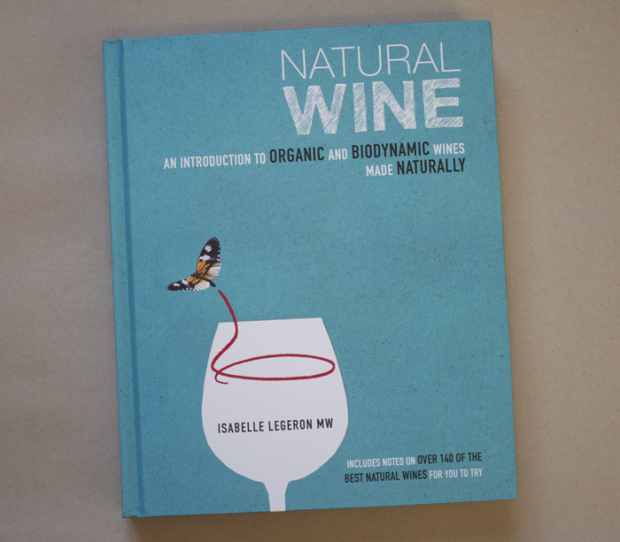
Isabelle Legeron’s book Natural Wine (Photo: Anthony Zinonos, Tumblr)
Hello Isabelle! Please tell us more about your background for readers who may be unfamiliar.
I’ve been in London for 20 years, but I’m originally from France. My family has a vineyard, so I was brought up farming and helping out, and that’s why I went to university, to never touch the ground again. But fast forward a few years and I went back to wine, and embarked on various wine studies, including the MW, which I passed in 2008. At first I was very much, you know…a classically trained wine person, tasting all the Parker point wines…and then progressively, I realized that these wines were tasting more and more the same. The reason why I went into the wine industry was to go back to the land, and do what my family was doing—to be outside—and I found as I was starting to mingle with the wine industry it was very corporate, and people were really removed from the farming.
So around then I started tasting wines that had personality, that were made by people who really cherished them—who raised them more like children than commodities. And what I discovered was that there was a leitmotif among all the wines I love—they are farmed well and made without intervention. I learned there is a small world of wine out there that are natural, and it’s a parallel to this huge industry.
After I passed my MW, I decided to dedicate myself to natural wine because they were the wines I was drinking at home. I created RAW to champion transparency. I now consult for a number of restaurants, and am curating the wine offering for a really cool project in the Caribbean that opened earlier this year—a 400-acre organic farm-cum-high-end eco resort called Belle Mont Farm at Kittitian Hill. It’s a farm-to-table project (their flagship restaurant ‘The Table’ is being set up by Dan Barber and his Blue Hill Farm team), and rather than opting for ornamental plants, almost everything on-site is edible—even the golf course! They’ve planted coffee, which will eventually be roasted on-site as well, so that they can serve the coffee grown on the land. Ditto for cocoa which they will also process at the property. It’s an amazing project with a real heart. It’s about redefining what it means to be Caribbean through the vehicle of food.
I also consult on wine for three places in London, and just about a year ago, I released my book called Natural Wine. My link to the coffee world is simply, I know James Hoffmann [a London-based author, coffee professional and World Barista Champion]—we’ve got offices just a few streets apart from each other in London. I personally rediscovered coffee about 3 years ago, and now I’m into it, you know (laughs)…now I travel with some Square Mile coffee, my grinder, my filters. I really get coffee. I have rediscovered acidity, perfume, elegance, length, texture, and I love this. Coffee is a big part of my day. James asked me if I would be up for doing a talk at the Re:co conference in Sweden and here I am!
Wine as an industry is in a way much more developed than coffee. We’ve been analysing wine and talking about it for centuries—working out the best glass for what grape, creating point systems and dissecting soil types. Coffee, especially focused on quality, is a much more nascent industry, but I think there are interesting parallels.
How do you define natural wine?
Simply put, natural wine is wine that is alive. It’s wine that has not been too highly processed—there’s literally still some life in the glass. Strictly speaking for me, natural wine is wine with nothing added and nothing removed. No additives added during the winemaking process, and then no filtering, no fining, no harsh additives in the bottle. It’s also about the vineyards: for natural wine the vineyards have to be farmed organically. The term “natural wine” covers both the vineyard and the winemaking process. Growers who make natural wine in the strict sense of the word are incredibly rare. There is the idea of naturalness, where the epicenter is pure fermented grape juice—and as you move away from that core and, for example, you start adding sulfites, fining or filtering, you move further and further away from the idea of naturalness and finally you get to a point where you cannot talk about naturalness anymore.
For us, and how we deal with this at RAW, we have natural wines, and then we have organic and biodynamic wines made with lower intervention than normal—not all wines at my fair are natural. The way we indicate that is, we ask growers to tell us exactly how they make their wines. So if there’s zero sulfites, there’s nothing added, it’s natural—then it strictly speaking fits the definition of natural wine because nothing has been added, and nothing removed. At home I mostly drink natural wine and I would not drink anything that has more than a total of 20 to 30 ppm sulfites.
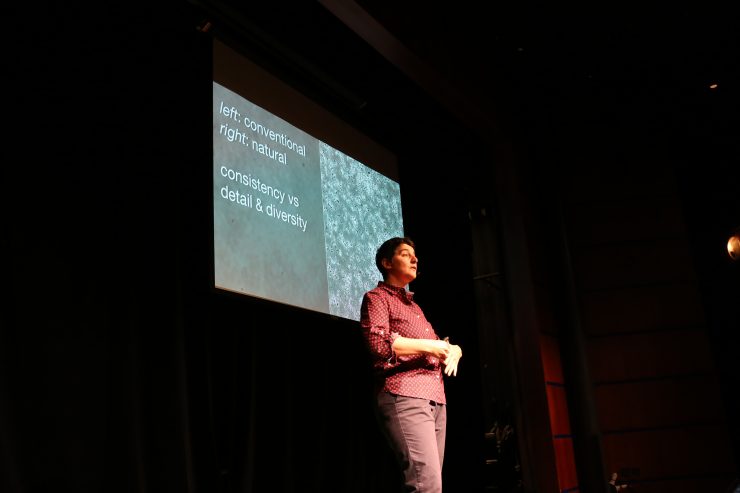
Conventional versus natural at Isabelle Legeron’s Re:co lecture. (Photo: Eileen P. Kenny for Sprudge)
What’s the difference between natural wine and organic wine, or biodynamic wine? Are these terms mutually exclusive? Are some wines both?
For me, part of being a natural wine is that you have to be organic in the vineyard. It pains me, it aches me, that I read stuff about certain wines and it says, “Oh, they’re natural wines” but they use all sorts of manmade pesticides in the vineyard, and still call themselves natural. It’s something I’ve started a conversation about with growers, and the AVN (Association des Vins Naturels) in France they’ve put forward a definition to the French government to help define what a natural wine truly is. We need to protect the term.
Natural wine is becoming hyper-marketized in a way that people talk about it everywhere. It’s very tempting as a winemaker to sort of just go ahead and call your wine ‘natural’. There is no one definition or no one person who defines what a natural wine is, I suppose. It’s a self-regulating term, for better or for worse. We rely on the goodwill of winemakers, as well as the press, to use the word carefully.
What ways are wine and coffee the same?
I must say that my understanding of coffee is fairly limited. I’m more on the receiving end of that industry. I see many parallels with natural wine and the type of coffee I love drinking now, these very delicate, pour-over filter coffees—it’s about purity, perfume, lightness, and acidity plays a big part. With natural wine growers, it’s not a big extracted winemaking technique. They won’t use big oak, which really masks the purity of the grape. And I think with roasting, it’s quite similar—if you roast a lot, and end up with very dark beans, you extract more bitterness, not unlike putting wine in a charred oak barrel.
It’s the same with all industries, all food industries—everything is coming back full circle, be it tea, cheese, what-have-you. These products are focused on the expression of where it comes from. And we’ve been doing that a lot with wine. Wine is very heavily influenced by the decisions made in the winemaking process. Coffee is the same way—you really impact the flavor profile through how the coffee is processed at the farm.
For me, when I really got into coffee, it was a moment of embracing the kind of slightly cloudy, complicated coffees. Before I wanted my coffee to be really dark. I had this idea in my head that coffee had to be really dark and taste really bitter. And now I like the sort of, much lighter, that sort of cloudiness . . . that texture you associate with good coffee, it reminds me of natural wine. And with natural wine you’ve had people come to accept cloudy wine. Natural wine says it’s okay that your wine is not clear, bright, pure—it can be unique and different.
We have been making wine for thousands of years, pretty much the same way. But over the past 50 years, wine production has become highly manipulated and controlled, not only in terms of machinery but also in terms of the sheer volume of additives used. In a way, the wine and coffee industries are coming out of this highly processed phase, moving from a highly corporate ethos towards something more unique and driven by a more hand-crafted approach. Before we wanted consistency, and now we cherish uniqueness in coffee and wine.
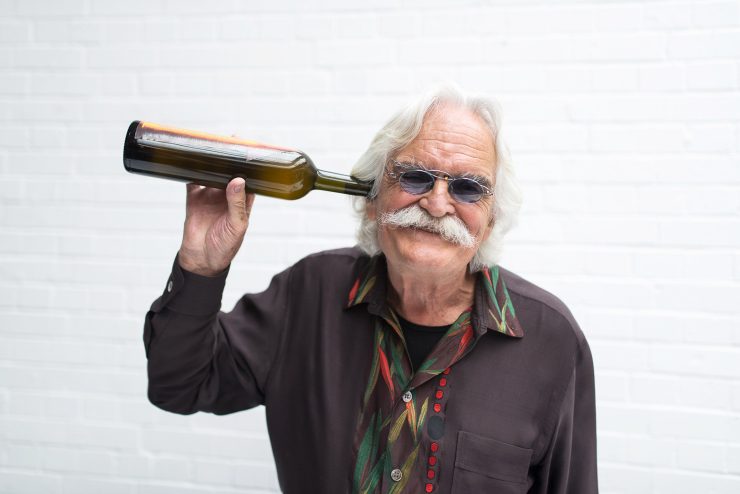
Winemaker Gabrio Bini, whose Serragghia natural wines from Pantelleria are featured at RAW Fair. (Photo: Giulia Mule for Sprudge)
What ways are wine and coffee very different?
The coffee industry looks up to the wine industry for thinking we’ve got it handled, and we really don’t. That’s the premise for my Re:co talk—to show that we’ve built this illusion that we have got it sorted out, that we have become extremely well-versed in the vocabulary of wine, that we have studied and understood our terroir. In short, we have succeeded to elevate wine into a sphere that’s all about the intellect and not really the senses. I don’t know which way coffee is headed, but with my industry, we need to be careful not to go too far, and focus back on the actual glass, just being able to experience a glass. And in a way, you know, for me I speak with people from the tea industry, the coffee industry, and chocolate industry, and they talk to me about flavors and how to describe this and I want to just say “whoa whoa”—the people who enjoy what you’re brewing or making, they need to enjoy it for themselves. You don’t want to be like, “this is what it takes like, this is what to expect.” Because we’ve done that in wine. We’ve dreadfully overdone that in terms of things like points and scoring.
Coffee people sometimes talk about a “god shot”—a shot of specialty coffee pulled as espresso, or more generally, an experience with specialty coffee that opened their eyes to how delicious it could be. Did you have something like that with natural wine?
Oh really! I have never heard this term. I think I should use it during my forthcoming talk at Re:co.
I suppose I always felt like I was a bit at odds with my industry. When I was studying for my MW, I thought—”What am I doing? Maybe I am making a mistake”—but there was one incident that started the process of natural wine properly for me. I was researching for my TV show on wine (called “Journey Into Wine“) in Hungary, and I asked some of my colleagues to set up a big wine tasting in Budapest. We conducted it totally blind, with like 150 wines from Hungary, and I ended up pulling two or three wines out of the bunch and saying, “I definitely want to meet this guy because his wines were so interesting”.
So that’s how I met Imre Kalo, a winemaker in Hungary. I met him and he didn’t speak any English, but he taught himself how to make wine without any schooling, and he works out of a tiny, hand-dug wine cellar where he makes some 140 different kinds of wine. You taste with him and it’s like, just all these wines—and he doesn’t even have a press, he has this little hand-dug cave, no equipment, everything is completely made by him by hand, and there’s just nothing. He makes extraordinary wines that he ages forever, wines with a lot of skin contact, orange wines. I spent a day with him and I realized, wow, you know, you’ve got this wine who taught himself how to make wine, who he just making these things out of great terroir, great farming, and I realized…you don’t need million dollar equipment. You don’t need a million dollar winery, or a fancy tasting room—you can make these incredible wines that are natural and alive, just like that. That was the beginning for me of a bigger realization, and then I began questioning everything. In a way, that was my “god shot” moment.
All this wine talk got you thirsty? Check out our list of 7 Natural Wines You Need In Your Life, adapted from recommendations in Isabelle Legeron’s book, Natural Wine.
Jordan Michelman is the co-founder of Sprudge.com. Read more Jordan Michelman on Sprudge.
The post Coffee & Wine: An Interview With Natural Wine Expert Isabelle Legeron appeared first on Sprudge.


